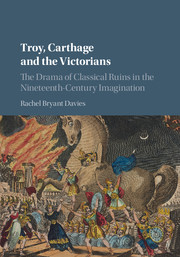 Troy, Carthage and the Victorians
Troy, Carthage and the Victorians Book contents
- Frontmatter
- Contents
- List of Plates
- List of Figures
- Acknowledgements
- Prologue
- 1 Introduction: The Ruins of Troy and Carthage ‘Still Flaming to the Imagination’ in the Nineteenth Century
- 2 ‘An Imaginary Troy’: Homeric Pilgrimage, Topography and Archaeology
- 3 ‘Not Classic, but Quite Correct’: The Trojan War at the Circus
- 4 Freely Perverted from Classic Texts’: The Iliad and Aeneid Burlesqued
- 5 ‘Sitting Among the Bricks of Covent Garden’: Carthage and the Future Ruins of the Nineteenth Century
- Epilogue: Troy and Carthage as ‘A Beacon and a Warning’
- Appendix A List of Burlesques
- Appendix B Select Chronology
- References
- Index
2 - ‘An Imaginary Troy’: Homeric Pilgrimage, Topography and Archaeology
Published online by Cambridge University Press: 03 March 2018
- Frontmatter
- Contents
- List of Plates
- List of Figures
- Acknowledgements
- Prologue
- 1 Introduction: The Ruins of Troy and Carthage ‘Still Flaming to the Imagination’ in the Nineteenth Century
- 2 ‘An Imaginary Troy’: Homeric Pilgrimage, Topography and Archaeology
- 3 ‘Not Classic, but Quite Correct’: The Trojan War at the Circus
- 4 Freely Perverted from Classic Texts’: The Iliad and Aeneid Burlesqued
- 5 ‘Sitting Among the Bricks of Covent Garden’: Carthage and the Future Ruins of the Nineteenth Century
- Epilogue: Troy and Carthage as ‘A Beacon and a Warning’
- Appendix A List of Burlesques
- Appendix B Select Chronology
- References
- Index
Summary
we do care about the authenticity of the tale of Troy.
Byron, Ravenna Journal, 11 January 1821What does the ordinary British taxpayer care about the site of Troy?
Daily News, 26 March 1873In the spring of 1873, fierce debate erupted at breakfast tables all over the country. Following its staid report on a meeting of the Society of Antiquaries, The Times probably did not anticipate the rather melodramatic ramifications of its follow-on publication of correspondence between the Society and the Chancellor of the Exchequer, who refused to fund excavations to find what Macmillan's Magazine labelled ‘an imaginary Troy’. This controversial decision was supported by The Daily News, which dismissed ‘antiquarian riddles’ of Troy's existence and the Iliad's authenticity as irrelevant to everyday life. Not just Priam's city but even classical antiquity itself, as the paper implicitly claimed, was worse than useless and lacked even the practical application of the ‘Druidical’ standing stones ‘on the plains of Carnac’ which at least provided building materials for ‘the Breton peasant’. The timing of this debate over the Antiquaries's controversial funding request would prove to be extraordinarily ironic. Only weeks later, the ‘sensation’ of Priam's treasure made Hisarlik and Schliemann household names. This coincidence surely contributed to the debate's surprising endurance in Britain's collective memory: five years on, the unlucky timing of the Chancellor's decision was still a viable target of Punch's satire (Figure 2.1).
The importance of this controversy is suggested by the extremity of the Daily News's position. This forms the clearest self-conscious debate about whether the existence of Homer's Troy mattered, and to whom: was it even possible to locate the epic city, and was the possibility of finding heroes's remains or literary landmarks worth the expense? This dispute is all the more telling because of its arena: sparked in the Society's sumptuous headquarters in Somerset House, this could easily have remained just a transitory spat, confined to the upper echelons of society.
- Type
- Chapter
- Information
- Troy, Carthage and the VictoriansThe Drama of Classical Ruins in the Nineteenth-Century Imagination, pp. 47 - 124Publisher: Cambridge University PressPrint publication year: 2018


